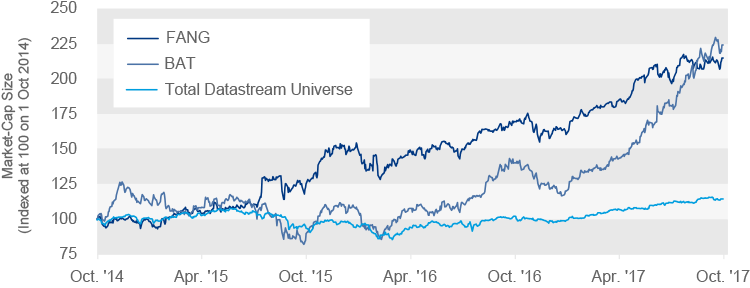by Neil Dwane, Chief Global Strategist, Allianz Global Investors
Summary
Investors have profited handsomely from FANG stocks and their Big Tech brethren, but Western regulators are responding to growing concerns about their behaviour. These masters of high-tech disruption may soon find themselves competing on a more regulated – and more level – playing field.
Key takeaways
- The EU recently fined Google and Amazon and is set to launch the GDPR. What’s next in the EU’s battle against Big Tech?
- The EU’s “turnover tax” is a new way to bite back at the FANGs – and another sign of growing headwinds for high-tech giants
- As Facebook and Google face hard questions about Russia’s role in US elections, they’re also fighting calls to police their networks
- FANGs still have huge potential and users enamoured of their services, and more oversight could make consumers even more comfortable
- As high-tech giants compete on a global stage, China’s BATs may be less politically vulnerable in Asia than the FANGs are in the West
Four mega-cap tech companies are so powerful and high-performing, Wall Street has dubbed them the FANG stocks – Facebook, Amazon, Netflix and Google. These four firms alone have turbo-charged US stockmarket returns in recent years, reaching more than USD 1.7 trillion in total market capitalization.
The Market Has Rewarded Big Disrupters
Market-cap path of FANG and BAT companies versus a broad global equity universe, 2014-2017

Source: Bloomberg (FANG, BAT) and Thomson Financial Datastream (universe). Data from 1 October 2014 to 30 September 2017. FANG = Facebook, Amazon, Netflix, Google (now Alphabet). BAT = Baidu, Alibaba, Tencent; market-cap size based on ADRs.
Just as the growth, earnings and cash generation of these Big Tech names have soared, so has their impact on economies and consumers, who are wowed by the services, price transparency and convenience they provide. As a result, there has until recently been little public pressure to challenge the dominance of these firms, which some critics liken to near-monopoly status. Yet these powerful companies are attracting greater scrutiny from regulators:
- In June 2017, European Union antitrust regulators fined Google EUR 2.4 billion for unfairly manipulating search results to benefit its own shopping platform.
- In October 2017, the European Commission levied a EUR 250 million fine against Amazon for receiving illegal state aid from Luxembourg.
- As the US government probes Russia’s alleged influence on US elections, it is asking hard questions about Facebook and Google’s roles in selling advertising and allowing “fake news” to proliferate.
- In May 2018, the European Union will implement a robust set of requirements – the General Data Protection Regulation (GDPR) – aimed at guarding personal information and reshaping how organizations approach data privacy. This will affect not only the FANG stocks, but any company with a digital presence in the EU.
"The EC recently ordered Amazon to pay EUR 250 million in back taxes to Luxembourg"
5 ways the disrupters could be disrupted
These regulatory pressures indicate that governments may be increasingly focused on reducing the market dominance of the FANGs and similar firms. The question now seems to be, will these masters of high-tech disruption soon find themselves disrupted? Here are five ways Big Tech may be feeling the heat.
What’s next for Big Tech?
Western governments have for the most part been happy to let Silicon Valley oversee itself, but it is clear that this grace period may be closing – especially in Europe. In addition to some of the new rules and pressures outlined above, we expect the playing field to be levelled further:
- The EU has launched a growing assault against US tech companies to ensure they pay their fair share of tax to society; it will soon announce a new plan that addresses cross-border sales tax rules.
- The US government has room to manoeuvre. Historically, concentrated power similar to that wielded by today’s Big Tech firms has led to government intervention – witness the breakup of the US telecom monopoly in the 1980s or US government actions against Microsoft in the 1990s.
- As the US Congress continues to probe Facebook and Google’s role in allegedly helping Russia influence US elections, it could fuel a growing backlash about issues ranging from political advertising to online privacy.
"Historically, large concentrations of power have led to government intervention – witness the telecoms in the ’90s and Microsoft in the ’80s"
Investment implications
It is growing increasingly possible that these regulatory pressures could soon begin to limit the almighty FANGs’ reach in the US and Europe – rich but small markets compared with the opportunities facing China’s BATs (Baidu, Alibaba and Tencent). These firms are in many ways the Chinese equivalents of the FANGs, yet as of now, the BATs aren’t facing the same level of increasing regulatory scrutiny as their FANG counterparts. With less-onerous oversight and a larger opportunity set in their own neighbourhoods – populations in Asia are exponentially bigger – one could make the case that the BATs may fly further than the FANGs.
Some or all the securities identified and described may represent securities purchased in client accounts. The reader should not assume that an investment in the securities identified was or will be profitable. The securities or companies identified do not represent all of the securities purchased, sold, or recommended for advisory clients. Actual holdings will vary for each client. FANG is an acronym widely used on Wall Street and among many investors; it stands for four high-performing large-cap technology companies – Facebook, Amazon, Netflix and Google (now Alphabet) – that are also household names. BAT is a similarly widely used acronym for three large-cap tech companies in China: Baidu, Alibaba and Tencent.













1. Digital advertising comes under pressure
2. “Free” content dilutes brand loyalty and bottom lines
3. Unused cash grows costly
4. Regulators crack down on data privacy
Political pressure leads to new “duty of care” requirement